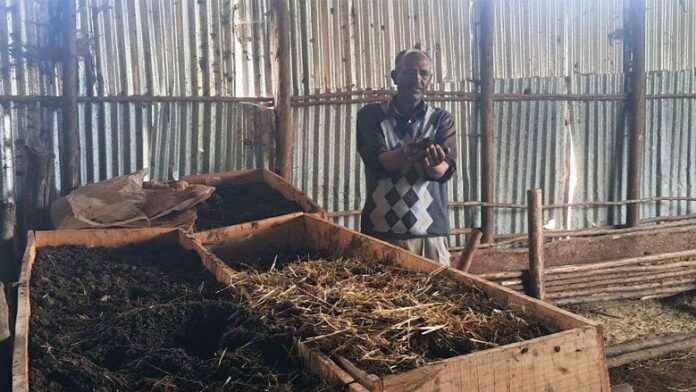A World Bank-supported initiative is transforming the fortunes of Ethiopian smallholder farmers by introducing sustainable farming techniques aimed at reviving soil health and bolstering food security.
According to the World Bank, the Ethiopia Food Systems Resilience Program (FSRP)—a collaborative effort with the Ethiopian government—has empowered over 1.2 million farmers with training in soil restoration, integrated pest management, and vermicomposting, leading to improved maize yields and greater resilience in rural communities.
FSRP has emerged as a leading force in addressing widespread soil degradation that had been threatening both livelihoods and national food security.
The program’s focus on integrated soil fertility management aims to counteract the effects of acidity, nutrient depletion, and erosion that had left much of Ethiopia’s arable land struggling to sustain productivity.
Through hands-on training and expert-led demonstrations at district agricultural offices, farmers have embraced techniques such as vermicomposting—which converts organic waste into nutrient-rich compost using earthworms—and integrated pest management, replacing harmful and ineffective reliance on chemical fertilizers.
Yohanis Tesfaye, a 56-year-old smallholder farmer from Jarso Bardada Kebele in Oromia, is among those, for the last two years, have been grappling with declining maize harvests and mounting food insecurity.
His once-fertile soils had become acidic and depleted, making it increasingly difficult to sustain his family’s staple crop. Chemical fertilizers failed to revive his land, and yields continued to fall season after season, deepening his household’s hardship.
That trajectory changed significantly after Yohanis began attending the FSRP trainings. He learned how to enrich his soil using vermicompost and leverage integrated soil fertility management strategies.
Since embracing these practices, his maize yields have visibly improved. His family now experiences greater food security, and his income has begun to recover—offering not just relief for his household, but also hope for community-wide resilience.
The challenges facing Ethiopian agriculture are profound: despite agriculture underpinning the livelihoods of over 85% of the nearly 129-million-strong population as of 2023, much of the country’s farmland is losing fertility due to erosion, unsustainable land use, and acidity, with an estimated seven million hectares severely affected.
The FSRP’s widespread reach—now encompassing more than a million farmers—signifies a vital step in breaking this cycle and guiding communities toward sustainable land use.
As such, the FSRP offers a scalable model: it demonstrates how, through knowledge transfer and practical, low-cost techniques, smallholder farmers can restore degraded land, increase crop yields, elevate food security, and reinforce their climate resilience.
For farmers like Yohanis Tesfaye, it represents a return to productivity and hope for a more stable, prosperous future.








